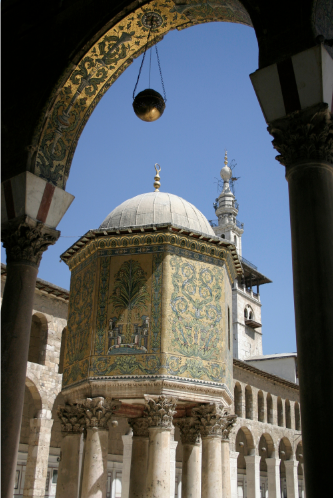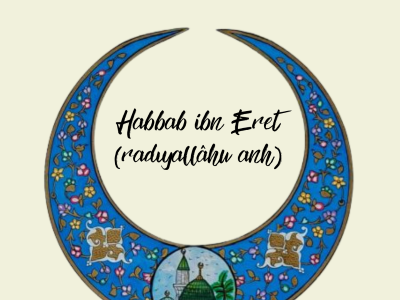Bilal al-Habashi, may God be pleased with him, was a black Abyssinian slave. He was one of the first fortunate individuals to embrace Islam. He was the melodious muezzin of the Prophet Muhammad, peace and blessings be upon him, a paragon of humility, and a devoted lover of the blessed Prophet.[1]
After proclaiming his faith, the honorable Bilal al-Habashi faced numerous tortures and hardships inflicted upon him by Umayya ibn Khalaf in the scorching sands of Mecca, with large stones placed on him while he was being tortured. Despite the torment, his recitations of “Ahad! Ahad!” (meaning “The Unique One of Absolute Unity”) could be heard. He endured the torture and was eventually rescued and granted freedom by the honorable Abu Bakr, may God be pleased with him.[2]
Bilal al-Habashi, who was always by the side of the blessed Prophet, found it unbearable to stay in Medina after the passing of the Messenger of God. The atmosphere of Medina no longer suited him. Living in that city without the Pride of the Universe, peace and blessings be upon him, became exceedingly difficult for him. When he sought permission from the Caliph at the time, the honorable Abu Bakr, to leave the blessed city of Medina, Abu Bakr asked, “O Bilal, who will call the adhan for us?” Bilal had attempted to recite the adhan a few times after the Messenger of God, but he couldn’t do it. When it came to the phrase “Ashadu anna Muhammadan Rasulullah” (meaning “I bear witness that Muhammad is the Messenger of God”), he went weak at the knees, and burst into tears. He couldn’t complete the adhan. His yearning for the Messenger of God didn’t allow him to. His thoughts were always with him. Thinking of him tormented him. The separation was too heavy for him, and he decided that he could no longer live in Medina, so he migrated to Syria.[3]
During his caliphate, the honorable Umar, may God be pleased with him, traveled throughout the Islamic lands. By chance, he found himself in Syria. He knew that the lover of the blessed Prophet, Bilal, was also there. He was aware that Bilal had stopped reciting the adhan. Through intermediaries, the honorable Umar sent a message to Bilal, saying, “Please, Bilal, recite the adhan once again. Let us remember the Messenger of God. Our hearts have longed for him so much.” Bilal al-Habashi couldn’t refuse the offer of the Caliph, the successor of the Messenger of God. He climbed a high dome in Damascus and began to chant like a nightingale. The skies of Damascus resonated with a voice they had never heard before. Those who heard the adhan rushed towards the muezzin. Umar ibn al-Khattab and the people of Damascus burst into tears. Their hearts were revived, and those unforgettable days came alive in everyone’s imagination. They recalled the days they spent with the Messenger of Go. Everyone was overwhelmed, experiencing the unique pleasure of those moments.[4]
This adhan became Bilal’s first and last adhan after the Messenger of God. He couldn’t bear the separation any longer. After this adhan, he embarked on the journey of his soul’s horizon. One day, the Prophet said, “O Bilal! Last night, in Paradise, I heard the sound of your sandals before me.” He had given him the glad tidings of Paradise. With this glad tiding, Bilal journeyed towards his Lord.
This call to Prayer became the honorable Bilal’s first and last call after the Messenger of God. He couldn’t bear it any longer and set off on his journey to reunite with his beloved. Shortly after this adhan, his spirit left this world. The Messenger of God once said, “O Bilal! Last night in Paradise, I heard the sound of your sandals before me,”[5] giving him the good news of Paradise. With this glad tidings, he walked towards his Lord.[6]
I am living the days of a great battle with my ego. The sincere thoughts and enthusiasm I once had have been replaced by despair and senseless fatigue. Until these days, amidst the hardships I faced in my own way, God Almighty has always uplifted and supported me. Divine grace rained down upon me like a shower. But this is the most difficult test. It is the relentless struggle between a person and their ego, and the swamp of despair.
Then suddenly, the honorable Bilal appears before me as a breath of fresh air, taking me away from that place, bringing me back to myself. Hope is instilled in me. I am in great need of these breaths that will turn me back to my Lord. I am sure you also have such needs. I am in need of those noble souls who ascend to the dome of the heart and proclaim the truth, calling out for it. These individuals, who do not stay away from sources of nourishment, first save themselves from this chaos. Then, like bees moving from flower to flower, they spread the pollen of hope in all directions, radiating light and distributing Divine enlightenment. They become like candles, melting away, emitting light around them, and motivating everyone to take action once again. We all encounter such people. Their gaze, speech, and posture remind us of God. They are not too far away. They appear right next to us. Sometimes they come from a distant land, sometimes they use the opportunities provided by technology to bridge the distance and sing the truth like nightingales. Those who do not speak negatively, who are not idle, and who have the intention to go wherever there is service to be done—let us follow in their footsteps. Let us open our phone contacts with this intention. Let us call them, find those people, and visit them. Let us request a conversation of closeness. Let us ask them to talk about the Messenger of God. Because we are in great need of these breaths that remind us of the honorable Bilal. In fact, we need each other. We need to refrain from speaking negatively, listen to each other, motivate, congratulate, and encourage one another, and establish connections with smiling eyes and engage in conversation. We are in great need of these things.
[1] Reşit Haylamaz, Gönül Tahtımızın Eşsiz Sultanı: Efendimiz (sallallâhu aleyhi ve sellem) (muhtasar), İstanbul: Muştu Yayınları, 2008, s. 101.
[2] “Müezzinimiz Bilal-i Habeşî”, http://www.peygamberyolu.com/muezzinimiz-bilal-i-habesi/
[3] “Bilâl-i Habeşî”, http://islamansiklopedisi.org.tr/bilal-i-habesi
[4] Harun Tokak, “Ben Bilal”, http://www.sonpeygamber.info/ben-bilal
[5] Buhârî, Teheccüd, 17.
[6] M. Fethullah Gülen, “Bilal-i Habeşî” (radıyallâhu anh), http://www.youtube.com/watch?v=WRdhw2bcaeM




